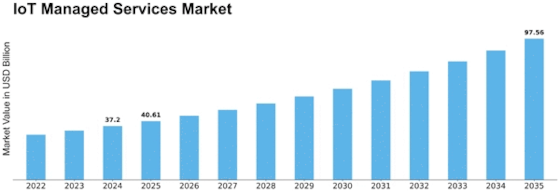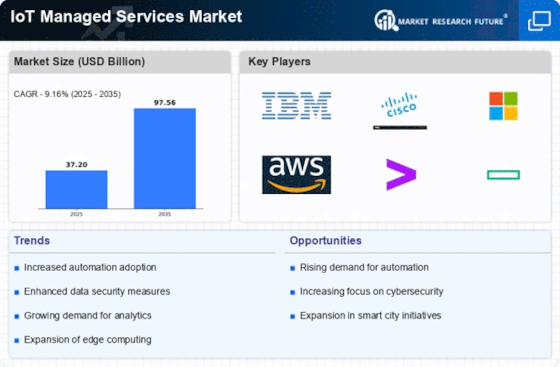Iot Managed Services Size
IoT Managed Services Market Growth Projections and Opportunities
The IoT (Internet of Things) Managed Services market is experiencing rapid growth, driven by the increasing adoption of IoT solutions across industries. In this dynamic landscape, market share positioning strategies are instrumental in determining the success of companies offering IoT managed services. A key strategy involves specialization, where companies focus on specific industry verticals or niche IoT applications. By tailoring their services to the unique needs of a particular sector, such as healthcare, manufacturing, or smart cities, companies can establish themselves as experts in that domain and attract a targeted customer base.
Pricing strategy plays a crucial role in market share positioning within the IoT Managed Services market. Companies need to strike a balance between affordability and the value delivered through their services. Some may adopt a competitive pricing approach to capture a larger market share, while others may position themselves as premium service providers by emphasizing advanced features, security, and reliability. The pricing strategy chosen should align with the perceived value of the managed services and cater to the budget constraints of diverse clients.
Effective marketing and brand building are integral components of market share positioning in the IoT Managed Services sector. Given the complex nature of IoT solutions, companies must communicate their expertise, reliability, and ability to manage the intricacies of interconnected devices and systems. Marketing efforts may involve showcasing successful case studies, highlighting security measures, and emphasizing the scalability of their managed services. Establishing a strong brand presence contributes to customer trust and recognition, influencing purchasing decisions in a competitive market.
Strategic partnerships and collaborations are significant contributors to market share positioning in the IoT Managed Services market. Forming alliances with IoT hardware manufacturers, software developers, or industry-specific solution providers can expand the range of services offered and create comprehensive IoT ecosystems. Additionally, partnerships with telecommunications companies to leverage connectivity solutions and cloud service providers for scalable infrastructure enhance the overall value proposition.
Innovation remains a cornerstone of market share positioning in the IoT Managed Services market. With the IoT landscape evolving rapidly, companies must stay ahead of technological advancements to provide cutting-edge solutions. This could involve incorporating artificial intelligence, machine learning, or advanced analytics to enhance the capabilities of managed services. Continuous research and development efforts are crucial to addressing emerging challenges and staying competitive in the ever-evolving IoT landscape.
Customer support and service reliability are paramount in the IoT Managed Services market. As businesses increasingly rely on IoT solutions for critical operations, ensuring uninterrupted service and prompt issue resolution is essential. Robust customer support, proactive monitoring, and regular updates contribute to overall customer satisfaction and retention. Positive customer experiences lead to long-term relationships, positive reviews, and referrals, all of which impact market share positioning.



















Leave a Comment